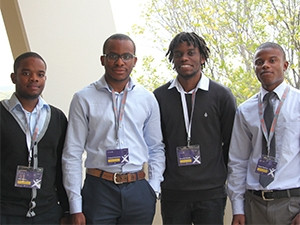
The introduction of an e-tender portal and central supplier database (CSD) are efforts by SA's government to stamp out tender fraud and make procurement more efficient and cost-effective.
Following president Jacob Zuma's directive as of last month, all government departments are compelled to advertise tenders online. The CSD acts as a uniform supply chain management system for government to optimise the efficiency of service delivery.
However, the measure still doesn't ensure no tender corruption occurs.
Recognising tender fraud as a "real African government problem", University of Johannesburg (UJ) student Chukwudi Obodoekwe, together with his team mates, set out to design a system that aims to curb tender corruption in SA's procurement system.
Obodoekwe, Rito Vukela, Kennedy Sigauke and Vuyane Ngwenya are all honours students at UJ's Academy of Computer Science and Software Engineering, who believe their system can ease the headache of tender corruption.
Obodoekwe told ITWeb: "The system aims to take the normal way in which tenders are done and move it to a computer-based programme. This is streamlining the entire process of tender management from the point of advertisement of the tender, how to decide on the best person to award the tender to, as well as post-tender stage management; this is like managing the progress of the project which you have been awarded."
All in the algorithms
According to Obodoekwe, the project was developed with the South African tender process in mind.
The students examined SA's standard bidding documentation and looked at how this can be extracted from being paper-based to computer-based, which will improve accountability, he explains.
Dubbed Kriterion, the system takes government's move to advertise tenders online a few steps further by eliminating the awarding of tenders to government officials who can be bribed and are prone to corruption.
The system works from the advertising stage, right through to the evaluation of bids, using the complex criteria in algorithms published by the South African government, to the awarding of tenders and post-project or post-milestone delivery ratings, Obodoekwe says.
"Our system has a bidding evaluation criterion, which is divided into a financial rating, security rating, technical and credit rating to evaluate the company or persons applying for the tender."
The system also has a built-in a critical 'reality-check' feature to allow industry experts to submit estimates of a realistic bid for a particular tender.
Kriterion has an added a layer of 'triple-blind' functionality to allow bidders on tenders, the industry experts and government officials to be completely anonymous to each other on the system, to reduce influencing of the tender award process.
Obodoekwe says while they believe in the value of their system for SA's tender process, government still needs to get involved. "We are students and there is not much we can do to get access to government officials to listen to us, so that is why we entered the Microsoft Imagine Cup as a means of publicity and to show the value of our system."
While the four young students wait for government to buy into the system, they continue to make strides in other parts of the industry.
Last week, the team won the 'World Citizenship' category of the South African leg of a global student software development challenge of the 2016 Microsoft Imagine Cup.
The Kriterion team members will represent SA in the next round of the competition between Europe, Middle East and Africa.
"We are looking to reach people that will see the value of the system. We don't want this to end where people believe this is a great idea, rather getting the SA government to recognise Kriterion and see the system being implemented for tender processes," states Obodoekwe.
Share